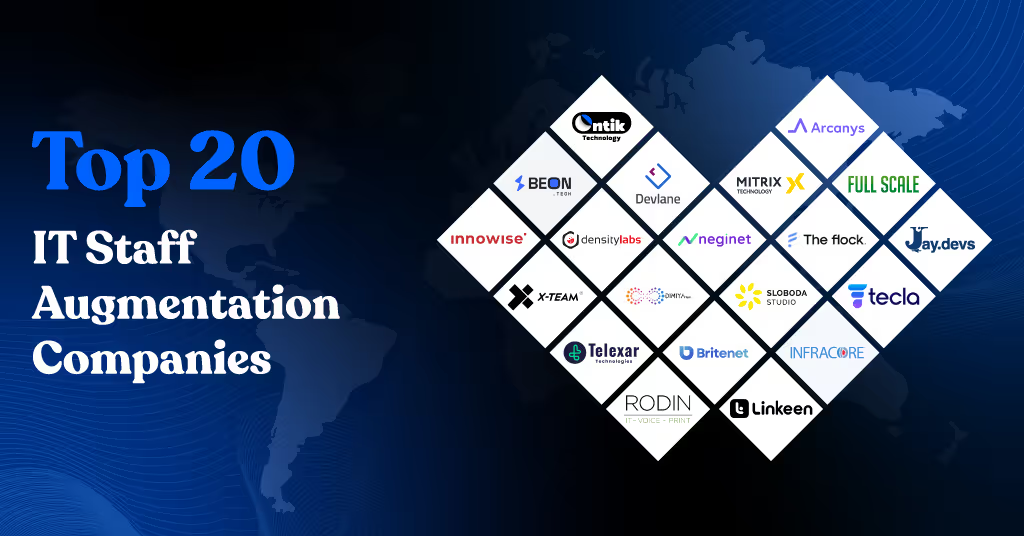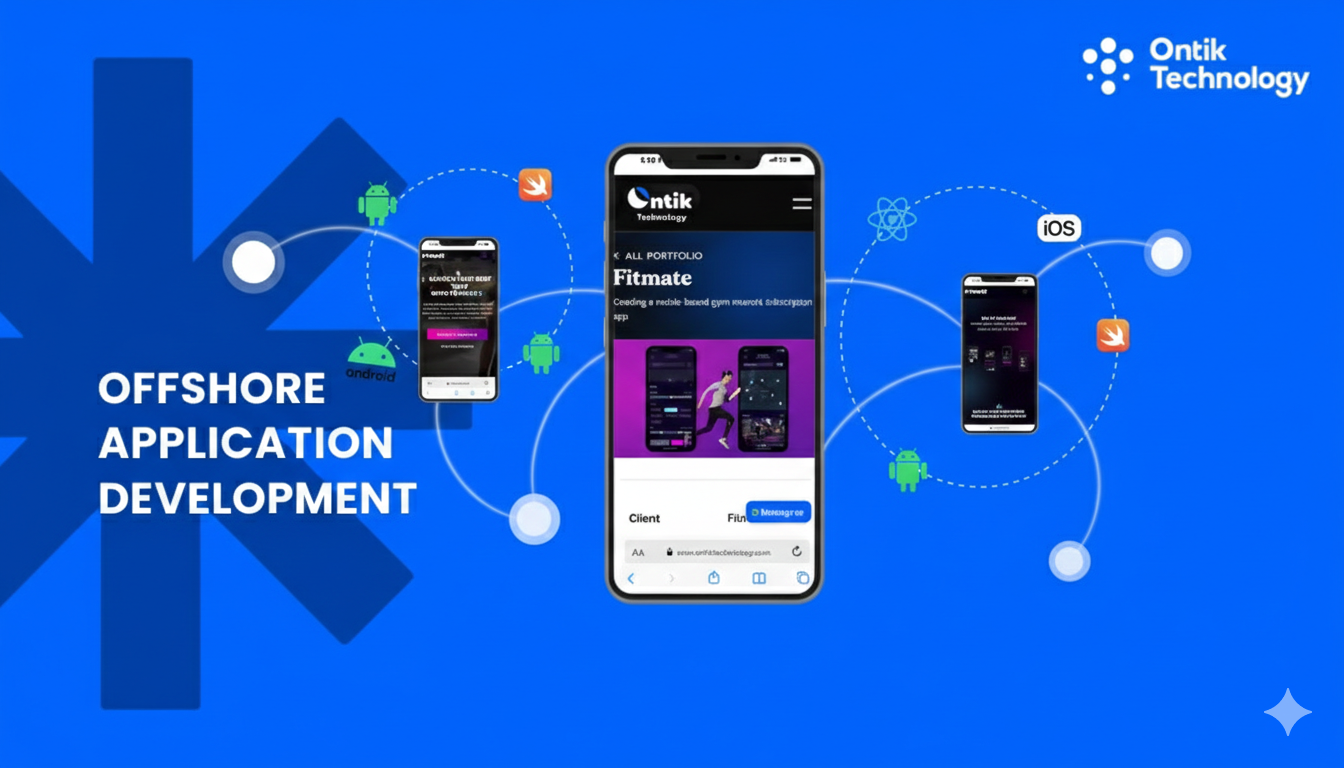Retool vs Bubble: A Strategic Guide
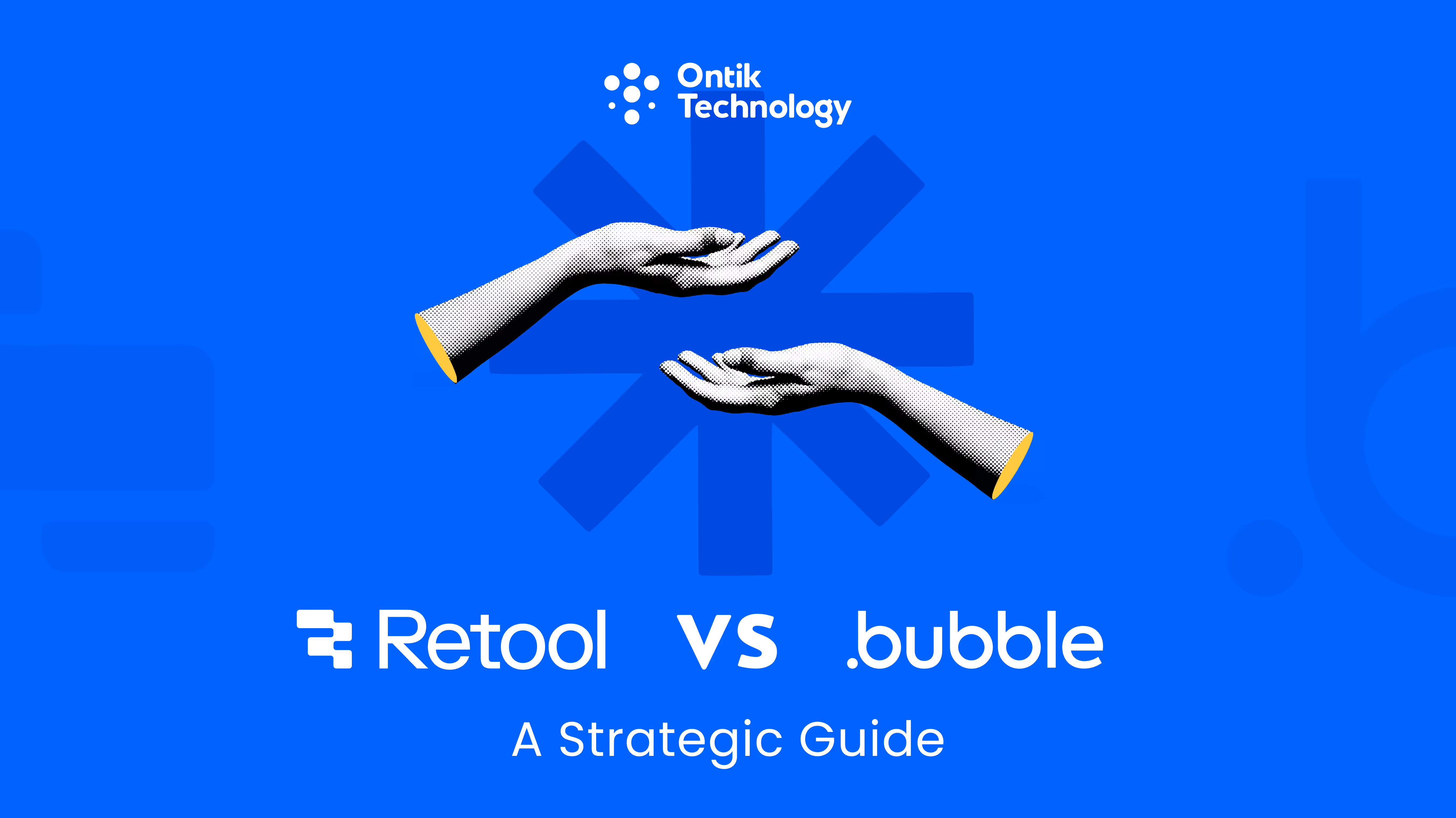
Are you confused about picking the right tool to build your app? Choosing between Retool vs Bubble can be tricky. Each platform is renowned for its features and use cases. Here are the questions about how you can choose and which one is fit for your business.
Don’t stress about choosing between Bubble and Retool—Ontik Technology is here to help you make the right decision. It’s not only about features or pricing; it’s about picking the tool that fits your business goals.
Yes, things like pricing and tools matter. But more important is how well the platform fits what you’re trying to build. Do you want to build simple internal tools that connect with other software you already use? Or are you planning to create a full app for customers with a nice design?
Retool is often used to make internal tools faster. It connects easily with other software and helps teams work better. On the other hand, Bubble is great for building complete web apps without code. You can design how your app looks and works with more control.
Each platform has its strengths and weaknesses. In this article, we’ll break down the Retool vs Bubble comparison for you. You’ll see their key differences, pricing, features, what users say, and even find out if there’s another tool you should consider.
What is a No-Code App Builder?
You don’t need to be a tech expert to build an app anymore. No-code tools help you make apps by clicking, dragging, and dropping. It’s like building with blocks—no coding needed. If you have a new idea for a product, you can turn it into an app quickly using no-code tools. You don’t have to hire a big team or wait for months. You and a small team can build, test, and launch faster. The basics of software development do help in building a robust application, but it is not a mandatory knowledge when starting.
No-code saves time and money. It helps you start your project fast and make changes easily. Whether you're a solo founder or a small team, no-code gives you the power to create your product and grow it, without writing any code.
Which is the Most Suitable Tool Between Retool vs Bubble?
Retool vs Bubble is a common debate for many who want to build apps without much coding. Both are popular in the no-code and low-code platform world. But they serve different people and needs. Let’s break it down simply.
What is Retool?
Retool is a low-code development platform. It’s built for developers who know how to work with code. If your company needs to build internal tools or handle many data sources, Retool makes it easy. It gives you ready-made UI components, and you can connect it with different systems fast. Retool offers easy control, quick setup, and works well with tools like Retool Git and Retool dashboards. It's a good choice if you want your work done fast and safely. That’s why many startups and big companies like using it.
So, what is Retool used for? Mostly for building apps that work behind the scenes, like admin panels, reports, or any app that manages internal data. Retool development is flexible, powerful, and trusted by teams that want more coding freedom.
What is Bubble?
Bubble is a no-code platform, meaning you can make apps without writing code. It is made for people who don’t know how to code but still want to build something useful. With Bubble, you can build full web applications like eCommerce stores, SaaS apps, or even social networks. It includes a built-in database and offers advanced features like API integration, plugins, and AI capabilities. Bubble offers many ready-made templates and design tools. But yes, there is a learning curve, especially for those who are new to app building.
When we compare Bubble vs Retool, the biggest key difference is who they are made for. Bubble is for creators and founders with no technical skills. Retool is for developers who want to move fast using existing tools and data.
Pricing Model and Bubble App Cost
When we look at Bubble.io pricing plans, you’ll see that Bubble is flexible. You pay as your app grows. But it can get expensive depending on storage, users, and plugins.
Retool also has a simple pricing plan, often on a per-user basis. It suits teams working on apps daily.
Use Case: If you need an internal tool that connects to your systems and lets your team work better, go with Retool. But if you want to launch a public web application, Bubble might be better.
Retool is best when speed and data control matter. Bubble is best when you want creative freedom and no coding. If needed, you can also hire remote Bubble and Retool developers.
Tool for Building Apps
Use Bubble to make something new from scratch without code. Use Retool to build internal tools using your current systems and tools.
Bubble includes drag-and-drop UI, a database, and design freedom. Retool makes it easy to plug into your APIs and databases fast.
In the Bubble.io vs Retool debate, your choice depends on what you need:
- Want fast, internal apps? Go with Retool.
- Want a complete app without coding? Use Bubble.
Bubble might be better for creators and startups. Retool excels in helping IT teams save time and control data.
If you’re thinking about Retool vs code, Retool helps you do more with less code. It's not for full apps but great for internal stuff. Bubble handles both UI and logic without code.
Choosing the Right Platform
Think about your needs. Do you need to build tools for your team? Or launch a full product? That's how you’ll pick between Bubble and Retool. There are many Retool competitors, but few offer the same speed and flexibility. Likewise, tools like Bubble give amazing creative power to non-coders.
In the bubble vs retool debate, both have their place. If you are a business owner, choose the right one that can fulfill your requirements, and both Bubble and Retool offer the best solutions to build powerful and user-friendly apps with or without code.
Quick Comparison - Retool vs Bubble
Here’s a quick and simple look at Retool vs Bubble. This comparison will help you understand the main differences so you can pick the best platform for your project needs. Here are the growing tools in the low-code world to give you a full picture. You’ll see how these platforms compare when it comes to how easy they are to use, how safe they are, how hard they are to learn, their pricing, and the kind of help and community they offer.
To help people pick the right no-code tool, we asked real users what matters most. In our 2024 No-Code Development Survey, over 350 no-code users — including founders, freelancers, and hobbyists — shared what’s important to them when choosing a no-code platform. From their answers, we made 17 key categories.
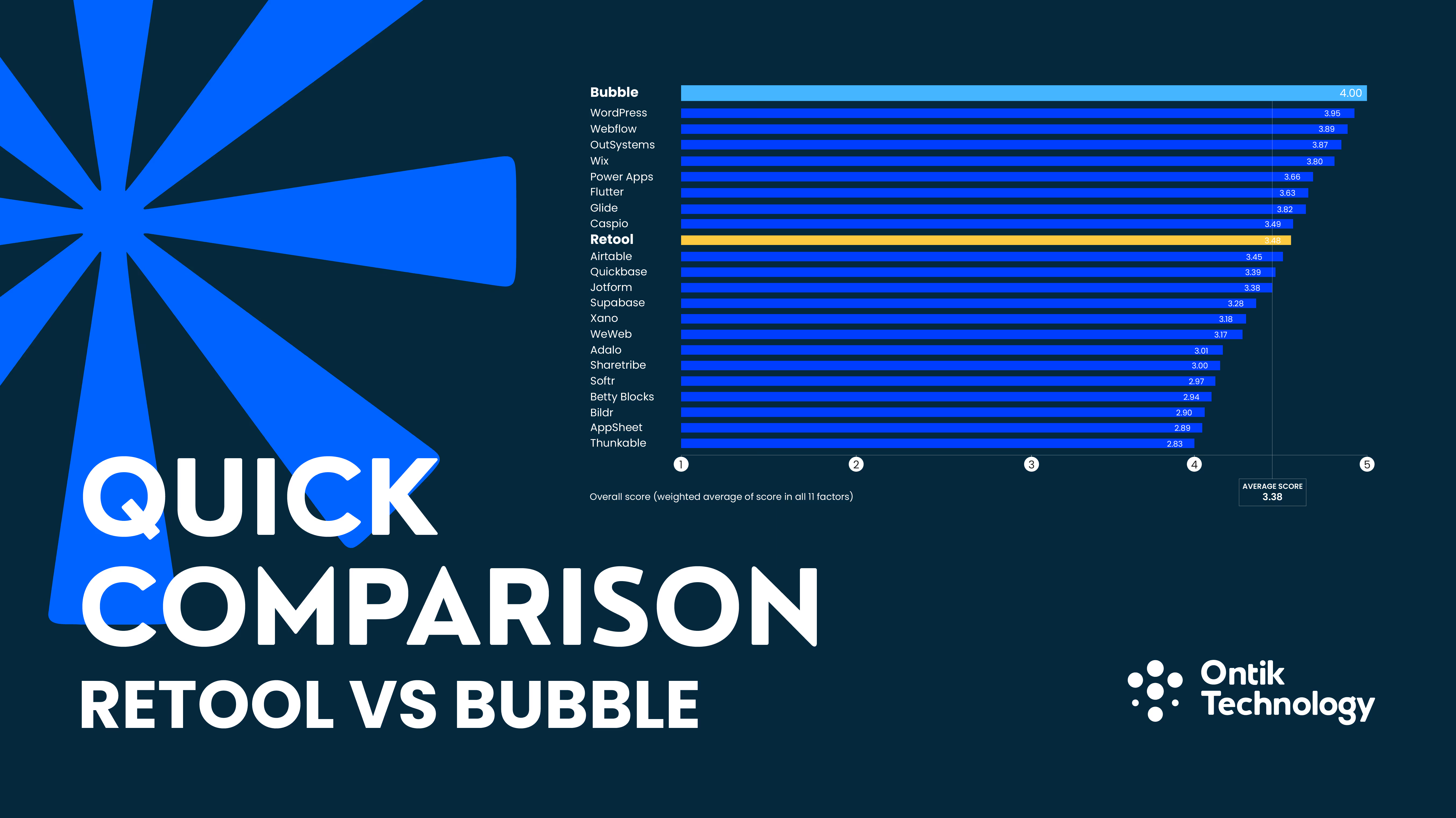
In late 2024, we gave Bubble and Retool a score from 1 to 5 in each category, with 5 being the best. Each score was based on clear rules, which we’ll explain shortly. We also gave both platforms an overall score, using a weighted average. This means the categories that mattered most to no-code users got more value in the final score. Let’s now see how Bubble and Retool performed.
Pricing Comparison: Retool vs Bubble
Look at this table to understand how much Retool costs. Retool has four plans: Free, Team, Business, and Enterprise. Each plan is for different types of users, like small groups or big companies. Take a look at this table to understand how much Bubble, the no-code platform, costs. Bubble has five plans: Free, Starter, Growth, Team, and Enterprise. Each plan is made for different user needs—from beginners to big teams.
If you want to use Retool, this table helps you see the price for each plan (monthly and yearly) and what you get with it. It will also help you choose the best plan based on how many people are on your team and what tools you need. This table will show you the monthly and yearly prices for each plan. You’ll also see what features and benefits come with each one, so you can pick the best plan that fits your needs.
Retool Vs Bubble: Best Tool For Your Requirements If
Find the Best Tool for Your Requirements. If you're choosing between Bubble and Retool, consider your team's skills, app complexity, and development needs:
🟣 Bubble — Best Tool For Your Requirements If:
- You don’t know how to code but want to build web apps
- You want to build your app fast, in hours not weeks
- You need to build apps that handle complex data tasks
- You want to use custom APIs, external databases, or JavaScript plugins
- You run a small startup or a large business and need a flexible tool
- You want to explore tools similar to Bubble with more features
🔵 Retool — Best Tool For Your Requirements If:
- Your team wants to build apps quickly using less code
- You need to build admin panels, dashboards, or tools that manage data
- You’re a developer and want full control with advanced features
- Your team works with JavaScript or SQL and needs a custom setup
- You want secure hosting with custom SSO and security features
- You’re looking for better alternatives to Retool
Hire Top-Rated Retool & Bubble Developers from Ontik Technology
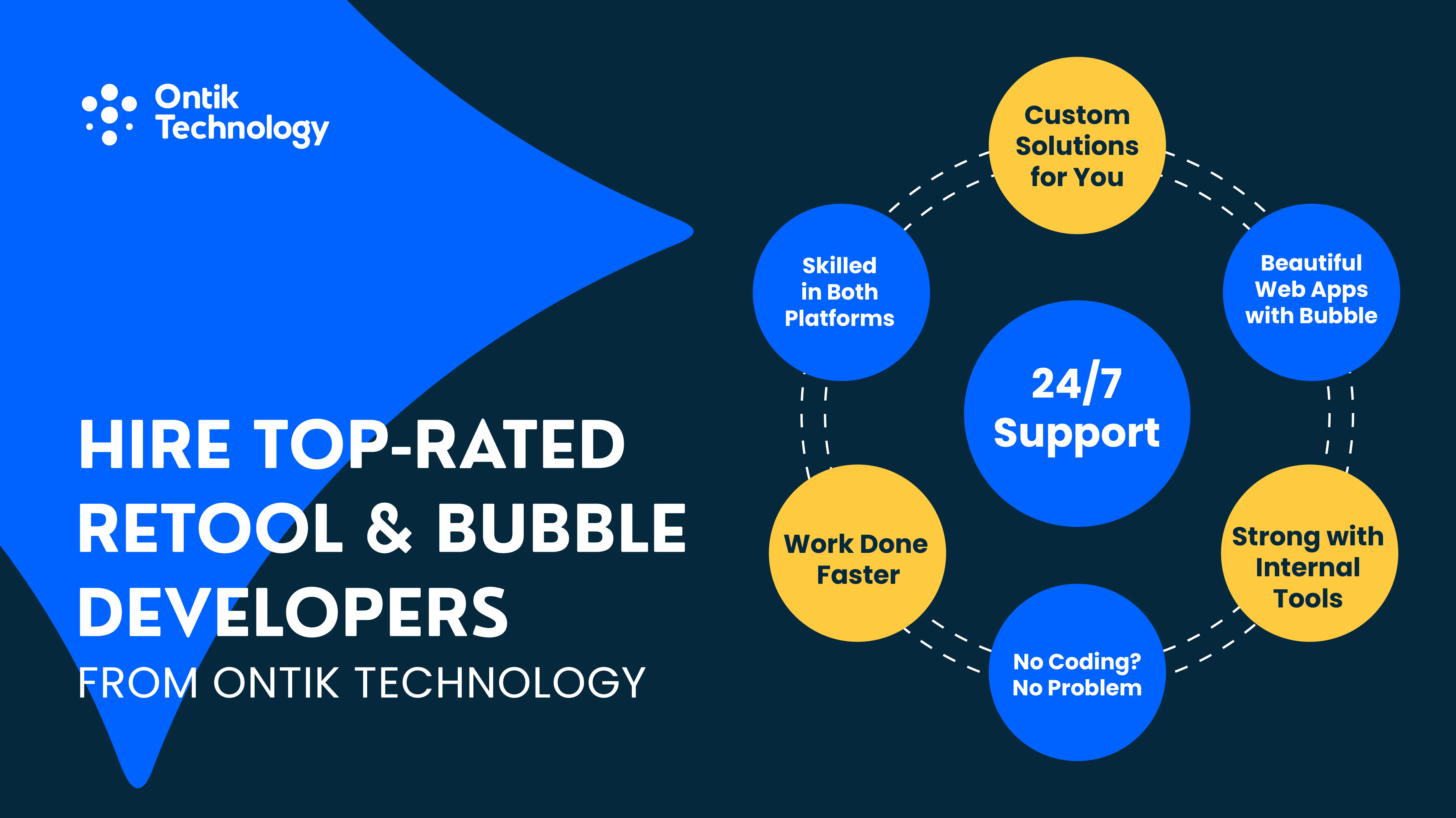
Why can you hire bubble developers and retool developers to build your digital products and any type of apps? Here are the key notes:
- Skilled in Both Platforms
Ontik Technology has developers who know Retool and Bubble really well. They can build both simple and complex apps fast. - Work Done Faster
Our team starts fast and finishes your work on time. No matter if it's a small update or a big app, they do it easily and without trouble. - No Coding? No Problem
We build apps without writing much code. That means less time, less cost, and no need to hire big dev teams. - Strong with Internal Tools
Ontik’s Retool and bubble experts are great at making powerful internal tools to help manage your data and workflow better. - Beautiful Web Apps with Bubble
Want to build a web app without code? Our Bubble developers can turn your idea into a real working app—fast and budget-friendly. - Custom Solutions for You
Every project is different. Our team listens first, then builds exactly what you need using the best parts of Retool or Bubble. So you can hire bubble developers or Retool developers based on your needs and requirements. - Great Support and Communication
You’ll always know what’s going on. Our team gives updates, answers questions, and works like they’re part of your company.
Conclusion
Retool and Bubble are both good, but they are made for different jobs. Use Retool if your team knows how to code and you need to build apps that work with lots of data or connect to other tools. Use Bubble if you don’t want to code and want to build apps fast. It’s great for people who are not developers.
To pick the right one, think about:
- What your app needs
- What your team can do
- What do you want to do in the future
Also, think about how big your app might get, what other tools it needs to work with, and how much time it will take to look after it later.


